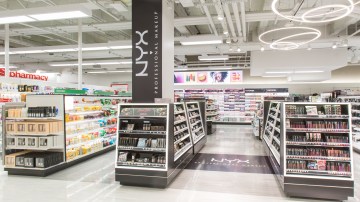As department stores continue to seek out new ways to bring in foot traffic, attention is shifting toward one category that’s actually growing: menswear.
To capitalize on the rising demand for menswear, Nordstorm announced this week that it began hiring employees for its first ever menswear store in Manhattan. The effort builds upon ongoing efforts to increase its menswear offerings, including its fraught acquisition of Trunk Club in 2015, and comes several years after competitors Bergdorf Goodman and Saks Fifth Avenue opened menswear shops of their own in the 1990s. Collectively, these retailers are setting their sights on new channels to grow their respective men’s fashion businesses, using tactics like expanding standalone shops and acquiring fast growing menswear startups.
The official opening on Nordstrom’s menswear store, slated for April of this year, comes nearly five years after the company first made the announcement. Brian Trunzo, senior menswear editor at WGSN, said, though somewhat delayed, the new store is reflective of a continued upward trend in men’s fashion.
“For at least the last five years, when it comes to year-over-year growth, the men’s apparel market has outpaced the women’s market by a healthy margin,” Trunzo said. “While that gap is narrowing, it still remains the case. It’s no surprise that Nordstrom would want to focus on men with laser-like clarity and precision in opening their first ever door in New York.”
According to data from retail analytics firm Edited, luxury menswear is anticipated to contribute $460 billion to the global retail market by 2020. In the first quarter of 2017, the volume of new menswear product arrivals was 27 percent greater than the same period in 2015. Much of this growth occurred in the categories of luxury and contemporary sneakers, the data found, with a rise of new arrivals of 75 percent higher in the first quarter of 2017, compared to 2015.
“Men have been in a fashion moment for the last few years; the category is explosive,” said Louis Digiacomo, svp and general merchandise manager at Saks Fifth Avenue. “Saks is capitalizing on this moment with enhanced, more fashion-influenced assortments — especially with the business-casual and athleisure trends — exclusive capsule collections, designer pop-ups and dedicated men’s stores, among many other activations.”
Tara Drury, menswear analyst at Edited, said Nordstrom’s effort to open the new menswear shop helps the brand maintain the momentum it’s experienced, particularly in activewear, which saw impressive sales during the recent holiday season. (Full-price sales sellouts increased by a reported 489 percent, compared to November and December of 2016, according to Edited.) At the same time, during Nordstrom’s third quarter earnings call to investors in November, the company reported that its top-ranking merchandise categories were men’s and kid’s apparel.
“By opening a dedicated menswear flagship, Nordstrom can meet increased demands for style-led, high-quality products,” Drury said. “One of the biggest trends for 2018 will be opening retail stores that not only address the male customer’s increasing concern over their appearance, but also provide an engaging and enjoyable shopping experience.”
For department stores like Nordstrom and Saks Fifth Avenue, experimenting with standalone menswear stores also serves as a response to the rise of new menswear commerce models from the likes of brands like Bonobos and Indochino. However, while the menswear business continues to grow, Trunzo said he wary of expanding brick-and-mortar retail efforts given the turbulence of the market, noting that the industry has changed dramatically since Nordstrom since first announced the store in 2012.
“Clearly, traditional retail is challenging in New York, and across the globe, right now,” he said. “But amidst all the closures and contraction, there remains great opportunity for innovators to grab market share and come out on top. It all comes down to vision and execution. Nordstrom has the horses, now they need to run the race. Time will tell.”
Looking ahead, Drury said retailers will need to be thoughtful in their approach to conceptualizing menswear standalone stores, particularly in the luxury space. Since many of these brands use New York as a test market, she encouraged companies to consider a global audience. “Seamless connectivity, multilingual staff to appeal to the international shopper and easy store navigation are key,” she said.



